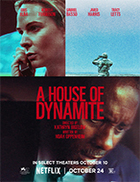A House of Dynamite
|  (Warning: This review contains spoilers, especially related to the end of the film. If you have not watched it and do not want to know how it ends, stop here and come back after you have watched it.) If you are upset by the ending of Kathryn Bigelow’s A House of Dynamite—and, if online chatter is to be believed, many people are—you are watching it for the wrong reason. Hollywood cinema has taught us to expect endings with strong closure, with only the slightest hints of ambiguity to be tolerated. If we spend two hours with an evolving narrative, we want to know how it ends, the implication being that the narrative itself exists solely to justify the emotional release of the ending—good or bad. We want to know if the hero lives or dies. Is the mission accomplished? The problem resolved? The couple reunited in blissful romantic harmony? Or, in the case of A House of Dynamite: Does a nuclear warhead strike the city of Chicago and kill 10 million people? And which retaliatory measure does the President of the United States choose to strike back despite not knowing who launched it?Alas, none of those questions are answered, and the anger and frustration with which so many have responded to the film’s apparent nonending is indicative not of some kind of failure on the part of the filmmakers, but rather confirmation of just how masterfully they have drawn us into the story, with its dozens of characters facing massive stakes. It has been a long time since the heyday of nuclear scare movies, which reached a kind of pinnacle in the early 1980s with the subtle drama Testament (1983), which focused on a suburban family dealing with the emotional fallout of nuclear war, and the visceral made-for-TV movie The Day After (1983), which terrified millions with its unrelenting depiction of nuclear devastation on the American heartland. The threat of nuclear war was evoked regularly in films such as WarGames (1983), The Terminator (1984), and Miracle Mile (1988), attesting to its prominent place in the American psyche at that time. With everything going on in the world and various madmen within reach of the button, it is little surprise that such fears are again finding their way into popular culture, with A House of Dynamite being a particularly sharp and highly focused evocation of what might happen. It is Bigelow’s first feature film since her charged historical dramas Zero Dark Thirty (2015) and Detroit (2017), which followed her multi-Oscar-winning war drama The Hurt Locker (2008), and little has changed in her immersive style and searing intensity, which is again aided and abetted by veteran cinematographer Barry Ackroyd, who thoroughly understands both the power and the limits of the shaky-cam. That approach is perfected suited to A House of Dynamite, which follows a nightmare scenario in which a single nuclear ICBM (inter-continental ballistic missile) is launched from somewhere in the Pacific and will hit Chicago in less than 20 minutes. That tense, insane period of time is played and then replayed three times from the perspective of three different groups of people in the White House Situation Room, Offut Air Force Base in Nebraska, and the Presidency. We are quickly and efficiently introduced to more than a dozen major characters, each of whom will play a significant role in making decisions about how to manage the unfolding event: Captain Olivia Walker (Rebecca Ferguson), the Situation Room oversight officer; Deputy National Security Advisor Jake Baerington (Gabriel Basso), who is patched in on his cell phone to try to offer insight and reason; Secretary of Defense Reid Baker (Jared Harris), who is revealed to have a close family member at the target site; and STRATCOM commander General Anthony Brady (Tracy Letts), who is the most hawkish voice among many. And constantly present, but not visually until the last third of the film, is the President (Idris Elba), who is just as shaken and distraught and unresolved as we imagine any normal human being would be in such a hideous scenario. The rewinding of time and replaying of events from different perspectives creates overlap, where in one segment we hear a voice over a phone line or see a face on a computer monitor, and in another segment we see that person in his or her environment, thus giving us a broader context. Some characters appear to be peripheral, only to emerge more fully formed in later sequences. And, in one of the most chilling moments, we briefly hear some kind of terror and confusion over a phone line and later see the actual event that elicited the response. The screenplay by Noah Oppenheim, who most recently co-created the similarly intense, world-ending Netflix mini-series Zero Day (2025), is a taught, sharp affair, loaded with jargon and acronyms that nonetheless will still make sense to the uninitiated. I can’t attest to how “realistic” the film’s scenario is or how “acuurate” are the responses of the various characters, but it certainly feels real enough and, more importantly, forces us to consider the wider forces that exist far outside our control, but nevertheless may very well determine our existence. All of the performances are strong and effective, which is particularly important because there is so little time to establish the characters. Each of the major characters gets a brief setup in a “normal” environment before the horror sets in, which is just enough to see them as human beings, rather than just functionaries of various power levels managing a crisis. Those who know more will likely quibble over the details, but on the whole A House of Dynamite is a powerful, enthralling drama that is hard, if not impossible, to shake. Copyright © 2025 James Kendrick Thoughts? E-mail James Kendrick All images copyright © Netflix |
Overall Rating: 


 (3.5)
(3.5)


